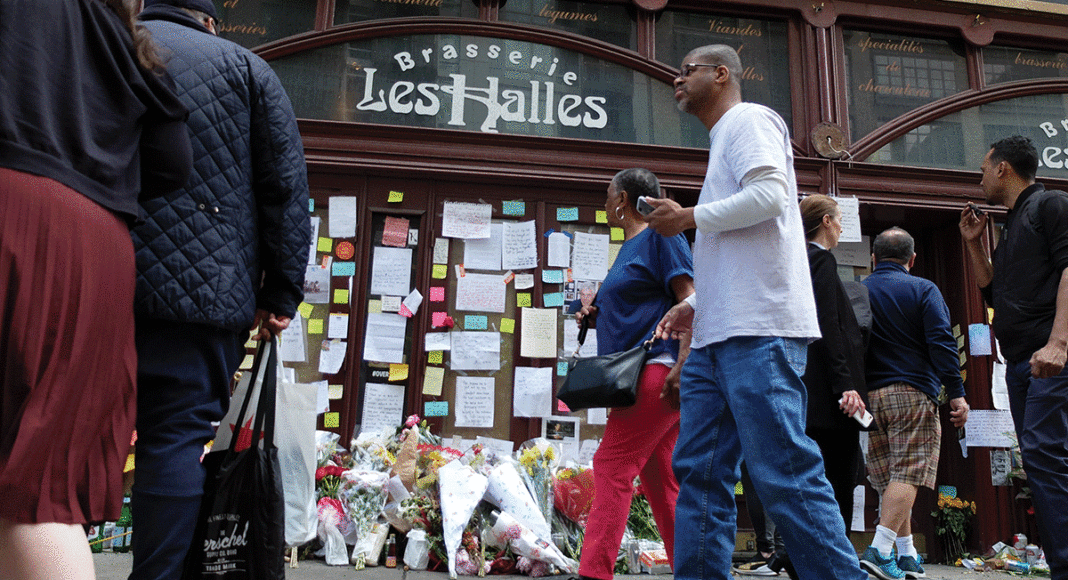On my darker days, I feel I live in an America bleached by corporate ambition and greed. The state of the rivers, oceans and forests is a barometer of our political times, our lifestyle. But when we blow the dust off that ’60s rally cry, “the personal is political,” we see what they meant: humans, too, are barometers.
The deterioration of culture and real connection—of taste, ambiance, sharing meals and honoring the food at the center of it all, resourcefulness, good music at the right volume, lemon zest, good sex—has been gnawing at me for months, and more subtly casting shadows for years.
Two weeks ago, amid a perfect storm of fraught sleep, hormones and the aforementioned social byproducts of a consumption-driven society—the corporate model of which thrives best on the exploitation of workers here and abroad—I self-medicated with the Tangiers and Congo episodes of early Parts Unknown, CNN’s travelogue show hosted by Anthony Bourdain. On that particular night, it worked. I felt reassured, inspired. Because Moroccan tajine! Because cafe culture still exists, though one may have to cross borders and entire oceans to slip into its chairs.
And so it goes. I cannot recall a celebrity death, nor its incomputable circumstances, that has shaken me harder than the loss of Anthony Bourdain last week. Bourdain’s work followed those remaining threads of real connection and culture and held them up for the world to see and taste. In so doing, he was a protector.
Rising from the underbelly of New York City kitchen culture, Bourdain’s No Reservations and Parts Unknown narrated a quest for the cultural glue at the center of it all: food. Not the protein bars and yogurt thrown into a work bag, the Trader Joe’s salad eaten at a desk. Cue his unmistakable voice: the “local stew, the humble taqueria’s mystery meat and the sincerely offered gift of a lightly grilled fish head.” It was a quest for that which does not merely sustain us physically, but pulls humans into a shared experience of tradition and love—eyeballs and all.
But Bourdain also broadcast to the mainstream in full color the world’s harsher realities, like low fish counts in rivers and ingeniously sourced meals cobbled together in areas of extreme poverty. One of the most well-traveled and well-fed humans to ever live, Bourdain was a self-made anomaly who shook his head in disbelief at his own luck. He seemed to have everything a man could want beyond his wildest dreams. The devastation of suicide’s premature credit roll comes with a thousand unanswered questions. Speculation is tortuous, its solace flimsy.
The media’s mishandling of Kate Spade’s suicide just days before Bourdain’s prompted outreach by the American Association of Suicidology and the American Foundation for Suicide Prevention to larger media houses, and a notable shift in how it addresses a growing elephant in America’s living room: Over the past two decades, tinged by an epidemic of prescription opioid addiction, mental illness has become the second most common cause of disability in the U.S., but its relationship to the economy is the inverse of its funding. Across age and ethnicity, suicide has risen by 30 percent since 1999 in half of the nation’s states, according to the Centers for Disease Control and Prevention. The number of Americans taking antidepressants for five years—15.5 million—has tripled since 2000. Many of these pharmaceuticals list suicide as their side effect, a fact Bourdain mentions in a 2011 interview with Marc Maron, in reference to his then-use of the drug Chantix to quit smoking.
Following Bourdain and Spade’s deaths, social media channels brimmed with heartbreak. But a new trend also emerged, as many admitted their own struggles with depression and suicidal ideation. As with those courageous figures of the #MeToo movement, says Alejandra Vargas, program coordinator at our local Suicide Prevention Services, those who brave potential ridicule to come forward are also “showing [those struggling] that ‘your loved ones, or people maybe you look up to, have also gone through this and survived and thrived.’ It normalizes. It helps us recognize that we’re not completely alone.”
We can’t bring back the beloved renegade chef or the loved ones we’ve lost to suicide, but the humanity we’ve seen thus far appears to be melting a long held stigma. And it’s inviting individual mental health and society’s overall health to finally sit down next to each other around the same table, because the stew is almost ready.
Local 24-hour crisis line: 1-877-ONE-LIFE. Staffed by a team of professionally trained volunteers, many of whom have life experience with suicidal ideation, on-hand to take calls 24/7. If you’re struggling with suicidal thoughts, or on the waitlist to see a therapist, or cannot afford to see a therapist and need someone to talk to, they await your call with compassion and equanimity. Servicing Santa Cruz, San Benito and Monterey counties. For more information visit suicidepreventionservice.org.













